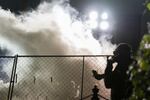As two Oregon civil rights organizations wage legal battles trying to bar the Portland Police Bureau from deploying tear gas and munitions during nightly protests against police brutality, the city's police chief said Tuesday such restrictions could result in more dangerous situations for protesters.
"CS gas is uncomfortable, but effective at dispersing crowds. We would rather not use it," said Chief Chuck Lovell in a video posted on his Twitter page. "... When tools are restricted that help us disperse crowds, the options are limited to batons or physical force. This makes it more likely people will be injured."
My statement regarding last night's demonstrations in Portland. pic.twitter.com/lbRHs3n5wY
— Chief Chuck Lovell (@ChiefCLovell) July 1, 2020
The statement came the day after police officers fired off tear gas to disperse protesters in North Portland, who had gathered near the police union. Speaker of the Oregon House Tina Kotek, who represents sections of North and Northeast Portland, emailed Mayor Ted Wheeler to say that police's use of the gas was "completely unacceptable."
In the past week, civil rights groups have taken actions to try and stop the police from using CS gas and so-called less-lethal weapons.
On Tuesday evening, attorneys representing Don't Shoot Portland and two protesters, asked a judge to impose sanctions against Portland police, saying officers had violated a federal judge's order to limit the use of tear gas and less-lethal munitions. At a press conference on Wednesday, Jesse Merrithew, an attorney representing protesters, said they may ask a judge for these sanctions to include banning weapons completely.
"It may be necessary to have a complete ban on any of these less-lethal weapons," Merrithew said. "If the PPB cannot use these things in a lawful manner then they should not have them. And if that step is necessary, that's what we have to do.
"We don't need our city's police bureau to have tear gas. We don't need our city police bureau to have guns that fire rubber bullets at people or launch pepper balls at people or blast them with sonic waves that harm their ears."

A seventh night of protests ended with police using tear gas, flash bangs and rubber bullets to dispersion the crowd. after protesters threw water, fruit, and bottles at police.
Jonathan Levinson / OPB
Attorneys working with the Oregon chapter of the American Civil Liberties Union have also asked a federal judge to curb the police bureau's use of weapons as part of a separate lawsuit.
On Tuesday, the group asked for a temporary restraining order against the city of Portland that would prevent city police from interfering with journalists and legal observers during the nightly protests against police violence.
Related: ACLU Sues Portland Police, Saying Officers Attacked Journalists At Protests
The filing comes on the heels of the group's class-action lawsuit filed over the weekend, which claims Portland police officers are targeting and attacking journalists and legal observers covering the protests. The lawsuit was filed by Oregon's chapter of the ACLU and law firm Braunhagey & Borden.
The new motion asks that a federal judge bar law enforcement from using weapons such as tear gas, pepper spray, rubber bullets and flash-bang grenades on journalists and observers or in crowds likely to contain them. The filing also seeks to prohibit law enforcement from arresting observers, “kettling" crowds where they might be located, and ordering them to stop recording the protests and disperse. The Portland Police Bureau has made it clear that when they give an order to disperse an area, they expect journalists to comply.
The ACLU argues these actions by law enforcement are violating the rights of observers to document how police respond to protesters.
“Punishing individuals for engaging in these protected activities violates the First Amendment, and the police’s conduct should be enjoined immediately to lift the storm cloud of fear and intimidation they have intentionally created,” the motion reads.
Related: Activists Push Back Against Good Protester-Bad Protester Narrative
Matthew Borden, an attorney with Braunhagey & Borden who is serving as co-counsel on the suit, said he's seen an influx of observers reach out who have been swept up in the policing tactics. According to the ACLU, two of their legal observers and a group of journalists, including some from the Portland Mercury, said they were afraid to report on the protests due to aggressive policing tactics.
“There was an outpouring of people who contacted us and who we've talked to in this community of reporters and journalists and observers — and it's almost like they have PTSD because they've just been shot at and tear gassed. There’s flash-bangs going off,” said Borden. "It is an incredibly intimidating and violent atmosphere.”
Borden said they’re hoping to have a hearing on the temporary restraining order before July 4. He said attorneys want to move quickly as observers have expressed fear of covering the protests due to police response, either leaving early from the protests or stopping altogether.
“Every day the press can't cover these important events, things are happening that people that are not going to know about,” Borden said. “And people who are at the demonstrations are at greater risk of being hurt by the police and nobody’s monitoring our government."
The city of Portland does not comment on pending litigation.
